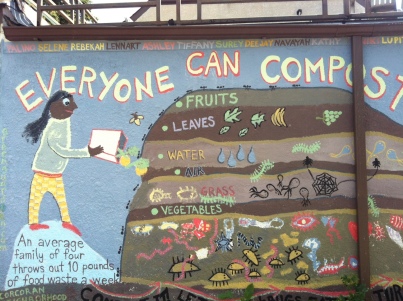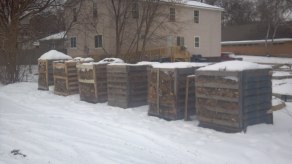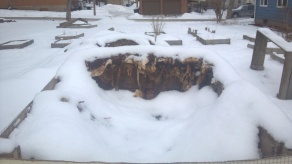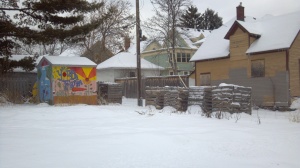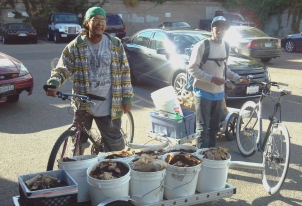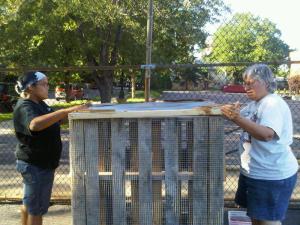My first excursion with the Compostadores took place on an icy fall morning in 2010 after Patsy, the Lead Compostadore, told me that she’d take me on an outing to dump compost. When I got into her veggie-filled station wagon, I nervously glanced at her car’s dashboard. It prominently featured dozens of apple cores from months and probably years past – the “compost shrine,” as she calls it. As we pulled out of the parking lot and skidded around the corner, an entire 50-pound bucket of wet coffee grounds immediately sloshed over on the back seat. I bit my lip. Had I made a terrible decision to help get this composting program off the ground, er, grounded? (Since Patsy was the sole Compostadore and spent all her time picking up and dumping compost, I came onto the program through Minnesota GreenCorps to help develop the concept and build community partners.)
We turned into a back alley where a cobbled-together bin was sitting awaiting its lunch, and we jumped out to unload the contents of her car. I was poorly dressed and my toes were numb, but as I learned during the subsequent months, composting must happen 365 days a year.
Opening the first bag, I held my breath, expecting the kind of acrid, slimy mush like what used to sit moldering under my own family’s kitchen sink. But what we dragged out of those bags was as handsome an array of mouth-watering veggies as any that could be found at an up-scale farmers’ market. Beginning with a pleasing rainbow of brilliantly-hued Swiss Chard, we cradled supple leaves of kale in a bed of springy cabbage, still-fresh carrots, and a few misshapen-but-not-rotten apples and lemons. The bin looked like a gourmet salad bowl for a 500-person dinner party.
I got back in the car no longer frowning at my numb toes, but feeling a rekindled flame to mend America’s broken food system. I’d worked on food waste issues previously with groups targeting homelessness, assuring food access, and implementing commercial composting systems at farmers markets, restaurants, and events (through locally-based Eureka Recycling). But nothing makes America’s food problems feel as tangible as having to pick up and dump several hundred pounds of compost at a time by bicycle.
Since those days, the Compostadores have been able to hire four cyclist composters and run several routes at a time. Working on composting issues with Gardening Matters has been an incredible learning experience — from the mundane details of bucket and bike logistics to advocating for policy change at the City and State levels — and I’ve benefited from a great team at Gardening Matters, a devoted advisory committee and numerous community partners.
When grappling with a loaded bike trailer, it’s easy to get frustrated by food waste, particularly since the Compostadores haven’t taken on giant producers like large supermarkets or cafeterias. But the conversations, educational opportunities, and the sheer volume of neighborhood-based composting efforts do make a dent in the food system, both physically and morally.
I see locally-based composting as a form of restorative justice in a food system fraught with misdirection and violence. In our industrialized system, the farm workers, those who consume many overly processed foods, and the land all suffer from unjust systems and unhealthy food. In the state that our system exists, waste is ubiquitous and nutritious food can be a scarce commodity in many communities. But through composting we can get local producers involved in community solutions. We can keep this so-called waste as a local asset and use it productively. In keeping it out of the landfills and putting it into local gardens, we’re improving the air, the land, the water, and supporting home-grown food and healthy bodies. This is why the Compostadores program fits so nicely within the framework of Gardening Matters – neighborhood-based composting is about building community, reducing waste, and supporting healthy soils and the gardeners that make them happen.
I’m leaving Gardening Matters this month — a bittersweet departure –headed to Northern India to intern on the farm and training center Navdanya, started by food justice activist Vandana Shiva. While working there I’ll be studying agricultural issues on small farms and learning traditional and sustainable farming methods. Dr. Shiva’s work has been inspirational for me, and I am thrilled to learn more about her efforts with international movements for food justice and equity.
I am pleased to introduce the new Compostadores Program Coordinator: Nate Schrecengost, founder of Pig’s Eye Urban Farm (now a part of Stone’s Throw Urban Farm) who will be taking over the compost fork for me next week. He’s had a great deal of experience working on Twin Cities-based urban food endeavors and community organizing. As we work to move the Compostadores towards a sustainable business model, I am confident that his strong background will serve the program well, complementing Patsy’s tireless hours spent outdoors doing compost rounds and our cyclists’ biking tenacity.
I’m eternally grateful for all the inspiration and wisdom that I’ve gleaned from so many community activists in the Twin Cities and beyond. Please do stay in touch!
In Soil-darity,
Rebecca
P.S. Look for the Compostadores at Will Allen’s Growing Power Conference on September 7-9 in Milwaukee – we’ll be presenting on Sunday!
